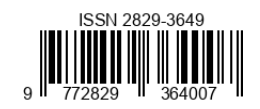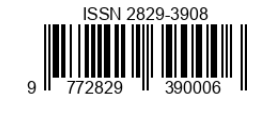Legal Legality of the Job Copyright Law After the Ruling of the Constitutional Court
DOI:
https://doi.org/10.56910/literacy.v3i1.1361Keywords:
Law, Legality, Job CreationAbstract
The Constitutional Court program has decided that the Job Creation Law Number 11 of 2020 is conditionally unconstitutional, which in the legal considerations of the Constitutional Court's decision explains that the process of forming the Job Creation Law is contrary to the 1945 Constitution. This research aims toknow how the Constitutional Court decides on the Job Creation Law and understand the legal implications of the enactment of the Job Creation Law. This type of research uses library research. The approach used is normative juridical. Data collection techniques use library research. The results of this research show that there is a need to improve the Job Creation Law through amendments or the formation of new laws involving active and substantial public participation. Based on the results of this research, it is hoped that it will become information and input for students, academics, practitioners, and all parties in need within the Faculty of Law, Pancasakti University, Tegal.
References
Book
Elisabeth Nurhaini Butarbutar, Legal Research Methods, Bandung: PT Refika Aditama, 2018, p. 148.
Peter Mahmud Marzuki, Legal Research, Jakarta: Kencana Group, 2018, p. 133.
Journal
Dixon Sanjaya and Rasji, "Formal Testing of the Job Creation Law in the Constitutional Court Decision Number 91/Puu-Xviii/2020", Adigama Law Journal, Volume 4, Number 2, December, 2021, p. 3259.
Fani Andriani, "Judicial Review of the Crime of Defamation Through Social Media Based on Article 27 Paragraph (3) of Law Number 11 of 2008 concerning Information and Electronic Transactions Linked to Freedom of Opinion", JOM Faculty of Law, Volume 3, Number 1, February , 2016, p. 237.
Ramanata Disurya, et al., "Violations of Principles in the Drafting and Ratification of Job Creation Laws", Law Journal, Volume 19, Number 1, January, 2021, p. 25.
Supriyadi, "Application of Criminal Law in Defamation Cases", Mimbar Hukum Journal, Volume 22, Number 1, February 2010, p. 38.
Wilma Silalahi, "Setting Quality Regulations to Guarantee the Supremacy of Law", Progressive Law Journal, Volume 8, Number 1, April, 2020, p. 56-66.
Legislation
The 1945 Constitution of the Republic of Indonesia
Law Number 13 of 2003 concerning Employment
Law Number 40 of 2004 concerning the Social Security System
Law Number 8 of 2011 concerning Amendments to Law Number 24 of 2003 concerning the Constitutional Court
Law Number 24 of 2011 concerning Social Security Administering Bodies
Law Number 15 of 2019 concerning Amendments to Law Number 12 of 2011 concerning the Formation of Legislative Regulations
Law Number 11 of 2020 concerning Job Creation
Website
BBC News Indonesia, "Job Creation Law: 'Fatal' Mistakes in the Omnibus Law Articles Due to a Reckless Legislation Process, Is the Law Worth Canceling?", 2020, quoted from the page https://www.bbc.com/indonesia/indonesia -54768000, accessed on 31 May 2022, at 20.00 WIB
Detiknews, "11 Cluster Omnibus Law Job Creation Law", quoted from the page https://news.detik.com/ Berita/d-4837745/, accessed on May 31 2022, at 21.30 WIB
Detiknews, "Job Creation Law Post Constitutional Court Decision", 2021, Quoted from pagehttps://news.detik.com/kolom/d-5833337/uu-buat-kerja-pasca-angkatan-mk. accessed on February 1 2022, at 20.15 WIB
Okenews, "Chronology of the birth of the Job Creation Law which has become controversial in society", 2020, quoted from the pagehttps://nasional.okezone.com/read/2020/10/07/337/2289793/kronologi-lahirnya-uu-buat-kerja-yang-jadi-kontroversial-di-community. accessed on February 1 2022, 20.00 WIB
Downloads
Published
How to Cite
Issue
Section
License
Copyright (c) 2024 LITERACY : International Scientific Journals of Social, Education, Humanities

This work is licensed under a Creative Commons Attribution-ShareAlike 4.0 International License.







